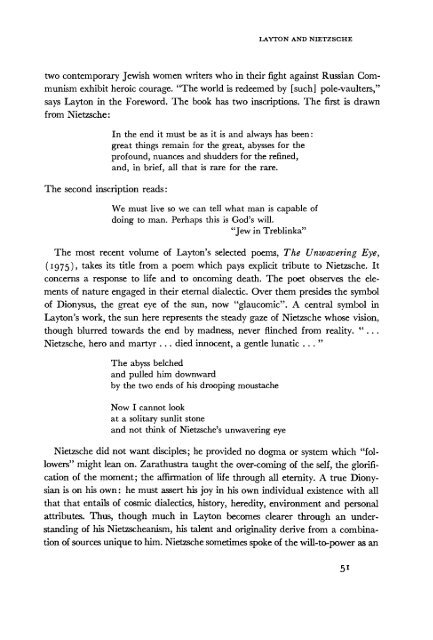LAYTON AND NIETZSCHE
LAYTON AND NIETZSCHE
LAYTON AND NIETZSCHE
Create successful ePaper yourself
Turn your PDF publications into a flip-book with our unique Google optimized e-Paper software.
<strong>LAYTON</strong> <strong>AND</strong> <strong>NIETZSCHE</strong><br />
two contemporary Jewish women writers who in their fight against Russian Communism<br />
exhibit heroic courage. "The world is redeemed by [such] pole-vaulters,"<br />
says Layton in the Foreword. The book has two inscriptions. The first is drawn<br />
from Nietzsche:<br />
The second inscription reads:<br />
In the end it must be as it is and always has been:<br />
great things remain for the great, abysses for the<br />
profound, nuances and shudders for the refined,<br />
and, in brief, all that is rare for the rare.<br />
We must live so we can tell what man is capable of<br />
doing to man. Perhaps this is God's will.<br />
"Jew in Treblinka"<br />
The most recent volume of Layton's selected poems, The Unwavering Eye,<br />
(1975), takes its title from a poem which pays explicit tribute to Nietzsche. It<br />
concerns a response to life and to oncoming death. The poet observes the elements<br />
of nature engaged in their eternal dialectic. Over them presides the symbol<br />
of Dionysus, the great eye of the sun, now "glaucomic". A central symbol in<br />
Layton's work, the sun here represents the steady gaze of Nietzsche whose vision,<br />
though blurred towards the end by madness, never flinched from reality. "...<br />
Nietzsche, hero and martyr ... died innocent, a gentle lunatic ..."<br />
The abyss belched<br />
and pulled him downward<br />
by the two ends of his drooping moustache<br />
Now I cannot look<br />
at a solitary sunlit stone<br />
and not think of Nietzsche's unwavering eye<br />
Nietzsche did not want disciples; he provided no dogma or system which "followers"<br />
might lean on. Zarathustra taught the over-coming of the self, the glorification<br />
of the moment; the affirmation of life through all eternity. A true Dionysian<br />
is on his own : he must assert his joy in his own individual existence with all<br />
that that entails of cosmic dialectics, history, heredity, environment and personal<br />
attributes. Thus, though much in Layton becomes clearer through an understanding<br />
of his Nietzscheanism, his talent and originality derive from a combination<br />
of sources unique to him. Nietzsche sometimes spoke of the will-to-power as an<br />
51

















